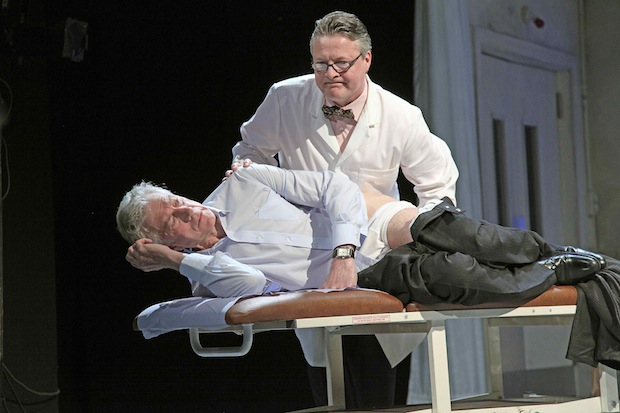How do you write a play? Here’s one theory. Put a guy up a tree, throw rocks at him, get him down again. It’s a good working template. Nick Payne’s latest script, Incognito, uses a different scheme. You put 21 guys up a tree, set them jabbering for 90 minutes and then go home. This cumbersome structure is greatly damaged by the decision to hire just four actors to play all 21 characters. And the locations, covering six decades, leap so often between Britain and America as to induce dizziness and possibly vomiting. There are no changes of costume, or set, to indicate where you are. You just have to guess.
One storyline involves a camp young Brit with chronic amnesia. Another traces a Scottish physicist who is turning, rather grandly, into a lesbian. Elsewhere, a rogue pathologist nicks Einstein’s brain in the hope of discovering the source of his genius. Later, an Einstein relative tries to repossess the brain so that DNA tests can be used to determine someone’s paternity. Would the whole noodle be needed for such an operation? Nope. Do any of the world-class boffins on stage spot this oversight? Afraid not. The central concept, a tussle over a famous noggin, is enough for a play but Payne seems to lack confidence in this apparatus so he buttresses it with spare rooms and redundant wings.
Happily the resulting mess will be saluted for its ‘intelligence’ because, as with his previous effort, Constellations, the script is loaded with fat slabs of chat about cosmic theory. (It’s worth noting, by the way, that he hasn’t yet found a means of dramatising these ideas; he just ladles great dollops of scientific observation into his characters’ mouths.) And at the risk of coming across as a bit of a dimwit I’m not convinced by this talk of ‘intelligence’. A London yuppie showing an interest in relativity is no different from a medieval bumpkin showing an interest in Noah. And to be curious about the earth’s origins doesn’t indicate intelligence but consciousness.
Anyway, it’s clear that Payne has pulled off the trick that Eliot ascribed to Shaw. He persuades his audiences that they, and he, share exceptional levels of sophistication and awareness. The time may come when he discovers how to create a satisfying drama too. He’s barely 30 years old. He’s got ages to learn the basics. And he certainly knows how to write a good joke. A character is asked if he slept well. ‘I didn’t stay awake to find out.’ Memo to Nick: repeating it later, unaltered, isn’t quite as funny. I’d cut that bit.
Stella Feehily’s pantomime about the NHS has two objectives First, to entertain audiences with a rip-roaring piece of knockabout comedy. Secondly, to blame devious politicians for trussing up the sacred bird and preparing it for sale to the highest bidder, probably an American insurance cartel. As propaganda the play’s methods are cruder than a Punch and Judy show. We’re treated to Churchill and Nye Bevan (both impersonated with skill and affection) debating the merits of nationalised healthcare. Then, two PR girls come skipping on stage with a cardboard graph that shows that the private finance initiative allowed hospitals to be built with public money lent at 8,500 per cent interest. ‘Why aren’t you more angry?’ they shout. Because it’s a play, not a Communist party rally, thanks.
The preachy bits occupy only a teeny smidgeon of the show’s running time and the bulk of the action is devoted to a hilarious satire set in a dysfunctional charnel house which calls itself a ‘hospital’. Frail old Iris (played with boundless comic zest by Stephanie Cole) is rushed to casualty after catching the collywobbles one afternoon. Her spell of treatment turns into a slapstick nightmare for her two grown-up children, whose polarised views of the NHS represent the main strands in the privatisation debate. The service is revealed in all its squalor and confusion: fresh blood spattered across the ceiling, demented patients left to starve, visitors incorrectly informed that their relatives are dead.
The script has no fear of causing offence. Dementia victims are mercilessly ribbed. A female civilian gives breakfast to a semi-conscious vicar who responds by goosing her breasts while his hot pink tongue squirms all over his lips. The Grim Reaper, with scythe and black cape, stalks the wards unnoticed by anyone. Is he after Iris or the NHS itself? Ultimately the play’s message is a tad confusing. If the damn thing is this bad no one would buy it. Equally, no one would want to preserve it. Rather than resolving this conundrum the play retreats into the deeply conservative and heavily opiated view that the NHS was at its best at the moment of its birth in 1948. And the poor baby never recovered.






Comments